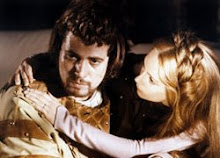Monday, May 12, 2008
The Numerous Slayings of Macbeth
In the play "Macbeth," King Duncan was killed by Macbeth in Act 2, Scenes 1-2. Lady Macbeth had desired kingship for Macbeth and wanted him to murder Duncan in order to obtain it. Macbeth, though originally reluctant, had eventually conformed to his wife's desire. Macbeth and Lady Macbeth had been scheming to murder King Duncan and seize his title ever since the witches made their predictions. When King Duncan decided to pay Macbeth a visit in Glamis, the opportunity for the murder arose. First, Lady Macbeth conjured up a concoction to poison the guards and then once Macbeth received a signal, in the form of a ringing bell from Lady Macbeth, he knew that the coast was clear. He then made his way to King Duncan's room where he proceeded to stab the King, despite his doubts and a number of supernatural omens, including a vision of a bloody dagger. In order to escape any accusations that may come his way, the dagger used to kill Duncan was strategically placed near the guards. The slayings didn't cease there. When Duncan’s death was discovered the next morning, Macbeth killed the chamberlains out of rage at "their" crime. Fearful of the witches’ prophecy that Banquo’s heirs will seize the throne, Macbeth hired a group of murderers to kill Banquo and his son Fleance. They managed to kill Banquo, however they failed to kill Fleance. Macbeth became furious because as long as Fleance is alive, he feared that his power remained insecure. Macbeth's conscience then got the best of him and he began to hallucinate. While hallucinating, he saw Banquo’s ghost. Frightened, Macbeth went to visit the witches in their cavern. There, he was presented with further prophecies: he must beware of Macduff; he is incapable of being harmed by any man born of woman; and he will be safe until Birnam Wood comes to Dunsinane Castle. Macbeth was relieved and felt secure because he knows that all men are born of women and that forests cannot move. When Macbeth learned that Macduff has fled to England, he ordered that Macduff’s castle be seized and, most cruelly, that Lady Macduff and her children be murdered. Once Macduff discovered the news about his family's execution, he was stricken with grief and vows revenge on Macbeth. Macduff and Malcolm, Duncan's son, along with the British army head to Scotland to challenge Macbeth's forces. Lady Macbeth, meanwhile, became plagued with fits of sleepwalking, in which she complained about the imaginary bloodstains on her hands and admitted to the murder. Before Macbeth’s opponents arrived, Macbeth received news that Lady Macbeth had killed herself, causing him to sink into a deep and pessimistic despair. Nevertheless, he awaited the English Army and remained confident that he'll prevail thanks to the witches' prophecies, which guarantee his invincibility. He was struck numb with fear, however, when he learned that the English army was shielded with boughs cut from Birnam Wood as they advanced. Birnam Wood was indeed coming to him, fulfilling half of the witches’ prophecy. On the battlefield, Macbeth encountered Macduff, who declared that he was not “of woman born” but was instead “untimely ripped” from his mother’s womb. Though he realized that he was doomed, Macbeth continued to fight until Macduff killed and beheaded him. Ultimately, Macbeth's selfishness not only cost him honour, love, obedience and a troop of friends, but his life.
Subscribe to:
Post Comments (Atom)













No comments:
Post a Comment